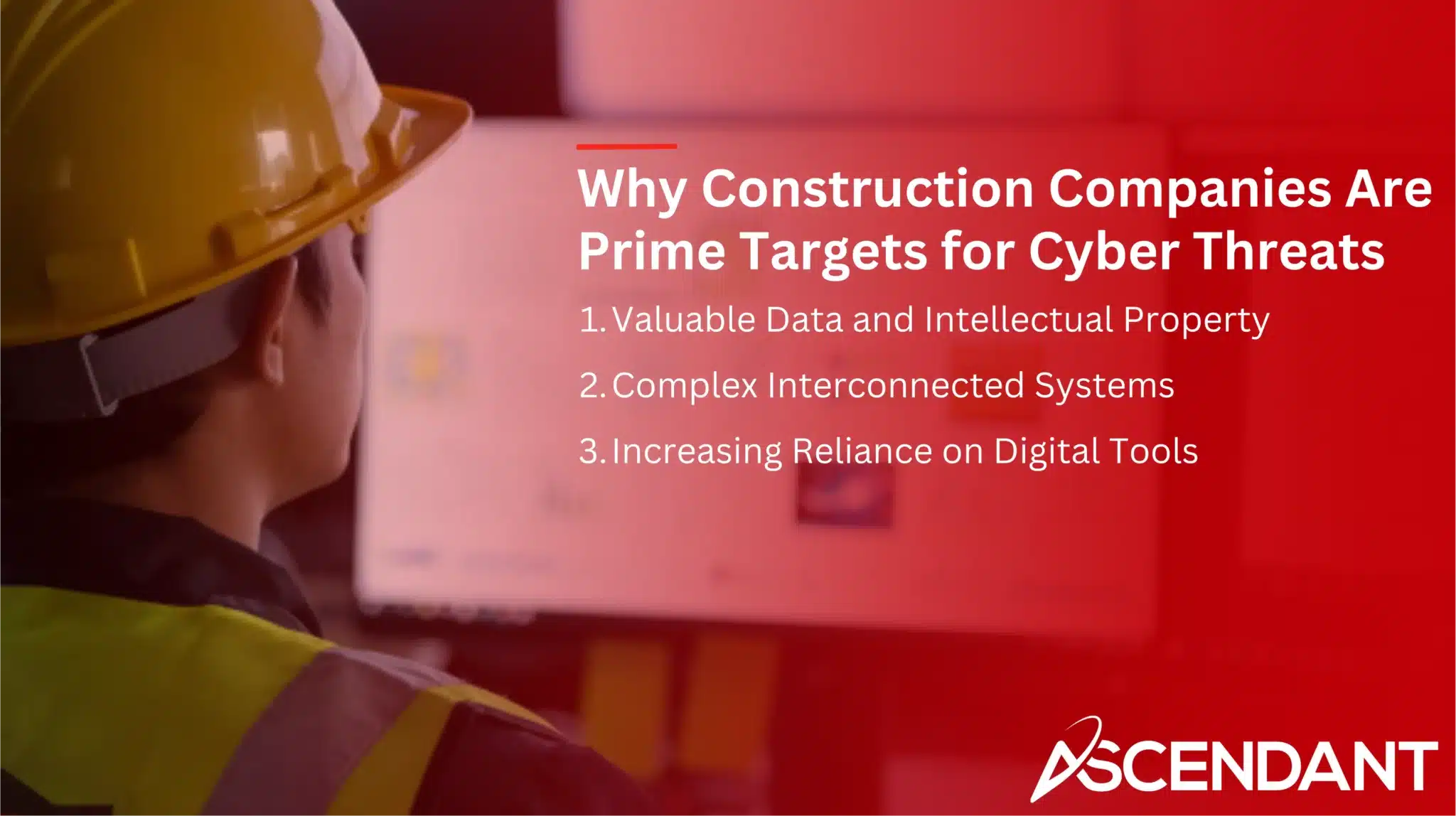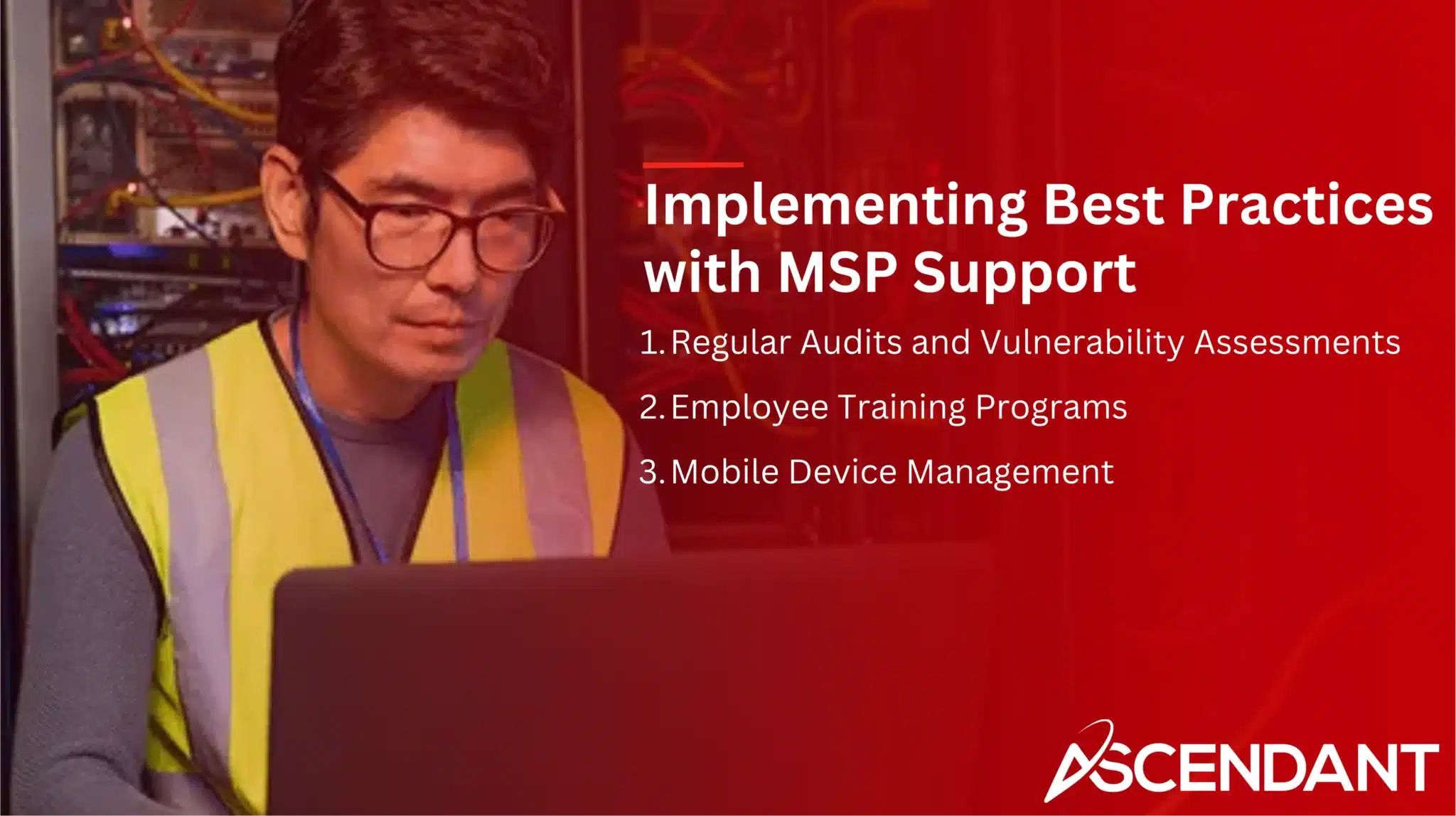Cybersecurity threats like phishing, ransomware, and data breaches are rising rapidly in the construction industry. Managed Service Providers (MSPs) offer essential support to tackle these issues. This article explores the main cybersecurity risks in construction and how MSPs can help your business mitigate these risks effectively.
In This Article:
- Cybersecurity Risks in the Construction Industry
- Why Construction Companies Are Prime Targets for Cyber Threats
- The Impact of Cyber Incidents on Construction Projects
- How MSPs Enhance Cybersecurity for Construction Firms
- Implementing Best Practices with MSP Support
- Future-Proofing Your Construction Business
Key Takeaways
- Cybersecurity threats in the construction sector have increased by 23% over the past year, with potential costs reaching $1.2 trillion by 2025.
- Phishing, ransomware, and data breaches are predominant risks that can cause operational disruptions and long-term financial losses for construction firms.
- Managed Service Providers (MSPs) enhance cybersecurity by providing ongoing monitoring, incident response services, and training, vital for safeguarding sensitive construction data.
Cybersecurity Risks in the Construction Industry
In the past year, there has been a noticeable 23% surge in cybercrime within the construction industry, posing a severe challenge to firms as potential costs from such attacks are forecasted to hit an extraordinary $1.2 trillion by the year 2025.
The structure of construction projects inherently presents a higher susceptibility to cyber threats due to their reliance on systems that are highly interconnected and involve collaboration among numerous stakeholders. As technology progresses and brings more connectivity into the sector’s operations, it also introduces greater security risks that necessitate vigilant attention from construction companies.
Embracing a proactive stance towards cybersecurity can markedly diminish the likelihood of these digital dangers and is crucial for ensuring not only compliance but also long-term resilience and expansion prospects for companies operating in this domain.
Phishing Attacks
The construction sector faces significant cybersecurity threats from phishing attacks, where fraudulent emails or counterfeit websites are designed to fool employees into disclosing sensitive data. By masquerading as legitimate correspondence from reliable entities, these schemes make it easier for malicious individuals to access confidential information.
Given that phishing attacks contribute to 22% of breaches and stand as a primary reason for security incidents, it’s essential for the construction industry to emphasize robust cybersecurity practices aimed at safeguarding against such dangers.
Ransomware Attacks
Cybercriminals engaging in ransomware attacks present a significant threat to construction firms by seizing their data and demanding payment for its return. Such incidents have precipitated considerable interruptions in the activities of prominent global construction companies.
These cyber extortion demands typically involve large sums of money, imposing financial burdens and interrupting essential data-related processes within the construction sector. This results in notable risks as well as expensive operational standstills.
Data Breaches
Cybercriminals often target the construction industry for its valuable assets such as intellectual property, client contracts, and financial documentation. The sensitive nature of data managed by construction companies, which encompasses blueprints, contractual agreements, and transaction details, makes them particularly attractive to cyber threats.
The consequences of data breaches can lead to extensive financial damage over time, confrontations with legal issues, and a profound erosion of trust from clients.
Why Construction Companies Are Prime Targets for Cyber Threats
The frequency of cyber incidents within the construction sector has seen a significant surge, experiencing a twofold increase from 2023 to 2024. Given its vast scale, intricate nature, and dependence on a network of stakeholders and linked supply chains, the construction industry is especially susceptible to cyber threats. The presence of high-value data alongside sophisticated operations renders construction companies prime targets for those engaged in cybercrime.
Exacerbating cybersecurity risks is the growing dependency on digital tools coupled with antiquated IT infrastructures that many firms in this field possess. Common tactics employed by adversaries include ransomware and malware attacks which seek to capitalize on these security gaps.
Valuable Data and Intellectual Property
Cyberattackers target construction firms due to their storage of high-value data, including sensitive financial records and proprietary design documents. The possession of intellectual property and critical project details makes these companies more susceptible to deliberate cyber intrusions seeking such information during data breaches.
Complex Interconnected Systems
In the construction sector, the reliance on interconnected systems elevates its vulnerability to cybersecurity threats. This susceptibility is compounded as more digital tools and external vendors become integral to operations, heightening the potential for cyber incidents. It is critical to recognize and tackle these security weak points.
As providers of managed services, MSPs are key in reducing these risks through their offerings of persistent surveillance, intelligence regarding threats, and services tailored for incident response.
Increasing Reliance on Digital Tools
In the construction sector, firms are embracing digital tools and collaboration platforms such as project management software to boost operational efficiency amidst a progressively digital environment. These technological solutions aid in streamlining efficiencies. They simultaneously amplify vulnerability to cyber risks which must be vigilantly addressed by companies within the industry. The pivotal role of technology is key in driving this shift.
Managed Service Providers (MSPs) provide gateways to these digital offerings while also implementing stringent cybersecurity strategies to guard against potential threats.
The Impact of Cyber Incidents on Construction Projects
Construction firms are at risk of incurring hefty financial repercussions and facing legal troubles due to cyber incidents. Such events can critically impair their project management systems, causing projects to fall behind schedule and deadlines to be unmet. Construction companies, especially those of small or medium size, face a high level of susceptibility to cyber threats that have the potential for significant disruption in operations.
Specifically, ransomware attacks can tarnish the reputation of a construction company by diminishing the trust and relationships it has built with clients.
Project Delays and Missed Deadlines
Cyber breaches can lead to significant disruptions in operations and cause a complete shutdown of ongoing construction projects. These incidents may result in missed deadlines, resulting in financial penalties, harm client relationships due to delays, and damage reputations.
Reputational Damage and Client Trust
In the construction industry, a data breach can inflict significant reputational damage on a company. Following such an incident, the loss of client trust can lead to missed business opportunities and lasting negative impacts on customer relationships.
As a result of this damage to their reputation, construction firms may experience a reduction in potential future business prospects.
Financial and Legal Repercussions
Data breaches can impose financial strains that may interrupt the regular operations of construction firms and jeopardize their sustainable future in the business. Failure to adhere to data protection standards might lead to substantial penalties and legal complications, including expensive lawsuits and reputational harm within the construction industry.
How MSPs Enhance Cybersecurity for Construction Firms
Partnering with Managed Service Providers (MSPs) can greatly improve cybersecurity for construction companies, as these providers apply security protocols uniformly across different client settings. By working with managed IT services that specialize in cybersecurity, construction firms are able to reduce their risk exposure and secure essential data more effectively.
Managed Service Providers implement thorough cybersecurity strategies which are crucial in protecting both the data and systems of a company. They make use of sophisticated technologies such as artificial intelligence and machine learning to bolster the detection of threats and fortify response mechanisms against potential cyber-attacks.
Comprehensive Services and Ongoing Monitoring
MSPs offer constant surveillance for threats, enabling prompt identification of possible security problems within construction companies. Their specialized knowledge in safeguarding data and addressing network weaknesses is crucial in defending sensitive information.
Endpoint Protection and Data Encryption
Construction companies handle personal client information, financial data, project plans, and intellectual property. Leading MSPs provide advanced security services. These include endpoint protection, real-time threat intelligence, and continuous threat detection. MSPs protect sensitive data by implementing measures such as firewalls, intrusion detection systems, data encryption, and multifactor authentication.
Incident Response and Recovery
To mitigate the effects of cyber incidents and guarantee ongoing operations, it is vital to have robust incident response and recovery strategies in place. Managed Service Providers (MSPs) offer specialized assistance for construction companies by adopting leading-edge practices and tools designed to bolster an organization’s preparedness for such events.
It is important that incident response plans clearly determine who will be responsible for what roles, lay out procedures for communication, and incorporate simulated exercises to confirm the team’s readiness.
Implementing Best Practices with MSP Support
Routine audits and assessments identify security vulnerabilities and ensure compliance with industry standards. Effective incident response requires not only plans but also regular training for staff to act swiftly during breaches.
Advanced security solutions like multi-factor authentication are essential for protecting sensitive data in the construction industry and ensuring data security.
Regular Audits and Vulnerability Assessments
Cybersecurity audits conducted on a regular basis help to pinpoint potential weaknesses before they become serious issues, allowing for the maintenance of up-to-date and efficient security defenses against new threats. Through vulnerability evaluations, construction companies can detect and remediate security flaws before they are taken advantage of.
By carrying out these preventive assessments, construction firms significantly improve their cybersecurity stance by confirming that strong security protocols are established and operational.
Employee Training Programs
In the construction industry, a major factor leading to cyber breaches is human error. By implementing rigorous security training that covers phishing and ransomware drills, educational cybersecurity films, and tests for understanding, this risk can be substantially lowered.
Employees who have received thorough training act as the primary safeguard against cybersecurity threats by efficiently identifying attempts at phishing and schemes involving social engineering.
Mobile Device Management
It is essential to use Mobile Device Management (MDM) solutions on construction sites for the effective protection and management of mobile devices involved in construction projects. These MDM systems help keep sensitive data related to construction secure by applying strict security policies across these devices, thereby maintaining the integrity of all information used during such projects.
Future-Proofing Your Construction Business
To keep up with the growing complexity of cyber threats, construction companies need to take preventive actions by adopting responsive cybersecurity strategies. These strategies are critical in handling the ever-changing nature of such security challenges. It is also vital that employees undergo regular training to sharpen their skills in identifying and combating a wide range of cybersecurity threats.
Top Managed Service Providers (MSPs) leverage cutting-edge technologies to provide constant threat monitoring and defense, which is key for ensuring the sustained success of these organizations.
Adapting to New Cybersecurity Risks
To counteract the evolving landscape of cyber threats, construction professionals must remain vigilant, continually enhance their expertise, and pursue ongoing improvements. This year, nearly fifty percent are poised to allocate funds toward novel digital solutions to reinforce their protective measures. Ensuring that sensitive information remains secure on cloud-based servers necessitates meticulous examinations of intelligent devices. It’s imperative for those in the industry to stay at the forefront of thwarting these threats as they develop.
Investing in Advanced Security Solutions
Managed Services Providers (MSPs) are essential in protecting the digital assets of construction firms from cyber threats. They deliver a broad range of services that consist of ongoing monitoring for network security and leveraging real-time threat intelligence to proactively spot and reduce risks.
To safeguard vital files and sensitive data, MSPs deploy strong security strategies including endpoint protection and encryption. Should any cyber incidents arise, MSPs provide specialized incident response as well as recovery solutions to help lessen damage and maintain the continuity of business operations.
Summary
Addressing cybersecurity risks is critical for the longevity and success of construction companies. By understanding the key threats and leveraging the expertise of MSPs, construction firms can implement robust security measures to protect their valuable data and operations. MSPs provide comprehensive services, including continuous monitoring, endpoint protection, and incident response, ensuring construction firms are well-equipped to handle cyber threats. Future-proofing your business with proactive cybersecurity strategies and ongoing employee training will help secure your construction projects and build client trust. Stay vigilant, invest in advanced security solutions, and partner with trusted MSPs to safeguard your construction business against the ever-evolving cyber landscape.
Frequently Asked Questions
Why are construction companies prime targets for cyber threats?
Construction companies are prime targets for cyber threats because they possess valuable data and operate through complex interconnected systems, increasing their vulnerability to cybercriminals.
The growing reliance on digital tools further amplifies these risks.
What are the common types of cyber attacks faced by construction firms?
Construction companies often encounter serious risks from phishing and ransomware attacks, as well as data breaches, which threaten their sensitive information and the ongoing operations of their business.
It is vital for these firms to tackle such threats in order to protect their valuable assets.
How can MSPs help enhance cybersecurity for construction firms?
Managed Service Providers (MSPs) can notably improve security measures within construction companies by providing continuous monitoring for threats, protecting endpoints, encrypting data, and offering incident response. This ensures that strong and steadfast security protocols are maintained.
By adopting this forward-looking strategy, MSPs help to protect confidential information and reduce potential risks for the firms in the construction sector.
What role does employee training play in cybersecurity?
Training employees plays a crucial role in strengthening cybersecurity by providing them with the necessary skills to recognize and thwart phishing attacks as well as social engineering strategies, thereby considerably reducing the chance of security breaches caused by human mistakes. Such a proactive strategy improves the security posture of an organization as a whole.
How can construction companies future-proof their business against cyber threats?
To future-proof against cyber threats, construction companies should implement proactive cybersecurity measures, invest in advanced security solutions, and provide ongoing employee training.
These actions create a robust defense against evolving cyber risks.




